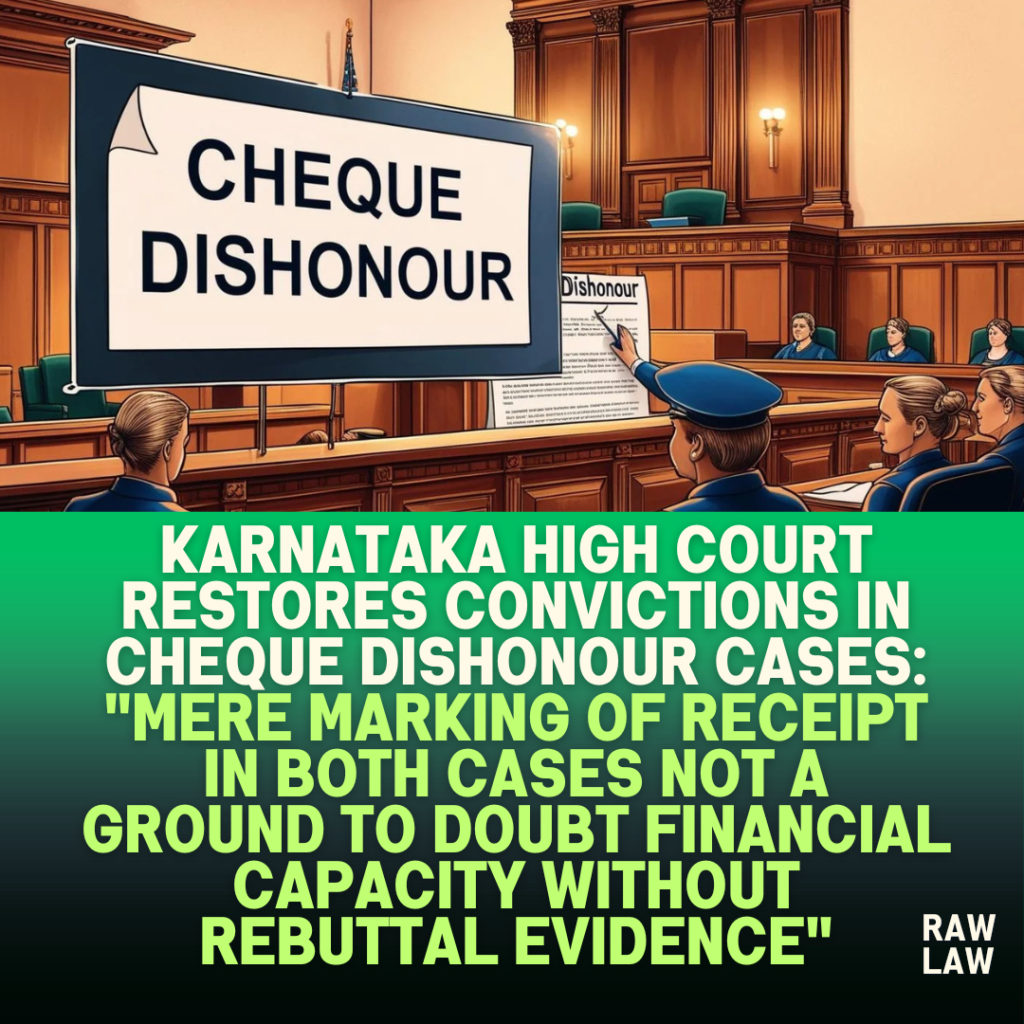Court’s Decision
In a detailed judgment dated 13 June 2025, the Karnataka High Court allowed two criminal appeals filed under Section 378(4) of the CrPC. The High Court:
- Set aside the acquittal of the accused and directed payment of ₹9,10,000 as compensation, out of which ₹9,00,000 is to be paid to the appellant and ₹10,000 to the State. Failure to pay would result in six months’ simple imprisonment.
- Set aside the appellate judgment of acquittal, restoring the trial court’s conviction order dated 30.09.2022.
The Court held that “unless rebuttal evidence is placed on record, mere confronting the documents cannot be a ground to disbelieve the case of the complainant” and emphasised that “there cannot be any finding on presumption and assumption.”
Facts
The appeals involved two cheque dishonour complaints filed under Section 138 of the Negotiable Instruments Act.
- In appeal 1, the complainant alleged that he paid ₹9 lakhs in cash to the accused to help him repay hand loans and expenses for his son’s marriage. The accused issued a cheque, which was dishonoured due to insufficient funds. A legal notice was served, but the accused neither responded nor repaid.
- In appeal 2, the complainant claimed to have advanced ₹5,50,000 to the accused for his cable business. The cheque dated 24.09.2021 was also dishonoured. A receipt acknowledging the loan was issued, but again the accused did not pay despite notice.
Issues
- Whether the acquittal was erroneous in absence of rebuttal evidence?
- Whether the First Appellate Court rightly reversed the conviction?
- What order should be passed?
Petitioner’s Arguments
The appellant’s counsel contended that:
- The trial courts failed to appreciate admissions by the accused and the documentary evidence produced, including the dishonoured cheques, receipts, and gold loan documents (Ex.P6 to Ex.P9).
- No rebuttal evidence was offered by the accused to displace the presumption under Section 139 of the NI Act.
- The accused’s claim that the cheques were given as security for chit fund dealings was unsubstantiated and unaccompanied by any complaint or corroborative material.
- The accused admitted signatures on the cheques and receipts, and failed to summon the witness Lohith, whose name appeared on the receipt as a witness.
Respondent’s Arguments
The respondents contended that:
- The complainant had marked the same receipt (Ex.P6) in both cases, casting doubt on its genuineness.
- There was no direct evidence that the complainant had the financial capacity to lend the money, especially as he had pledged gold to obtain funds.
- The accused issued the cheques and signed documents as security, not in pursuance of any actual loan.
- In appeal 2, the accused had repaid ₹3,50,000 of an earlier 2018 loan, and the cheque was allegedly misused.
Analysis of the Law
The Court reiterated that under Section 139 of the NI Act, once execution of the cheque is admitted, a presumption arises in favour of the complainant. The burden then shifts to the accused to rebut this presumption with cogent evidence.
The Court held that:
- In both cases, the accused admitted signing the cheques and receipts.
- The defence that the cheques were issued for a chit fund business was not supported by any documentary evidence or testimony.
- No complaint or legal notice was issued by the accused alleging misuse of the cheques or coercion.
- The trial and appellate courts erred in disbelieving the complainant’s version based on the repeated use of the receipt (Ex.P6) alone, without evaluating supporting documents (Ex.P7 to P9) and admissions by the accused.
Precedent Analysis
Though no specific case laws were cited in the judgment, the Court applied the well-settled principle laid down in cases interpreting Section 139 of the NI Act: once execution is admitted, the presumption of a legally enforceable debt arises and must be rebutted by the accused through credible evidence.
Court’s Reasoning
The High Court found:
- The trial court erred in ignoring the evidence regarding gold loans and financial capacity.
- The appellate court erred in reversing the trial court’s conviction solely based on the claim of prior loan repayment and use of Ex.P6 in both cases.
- The accused failed to call Lohith, a key witness, or produce any bank records, complaints, or corroboration for his version.
- Admissions in cross-examination and lack of rebuttal proved fatal to the accused’s case.
Conclusion
The High Court allowed both appeals. It restored the conviction and compensation orders, holding that the accused failed to rebut the presumption under Section 139 of the NI Act and had admitted to key elements of the complainant’s case.
Implications
The judgment strengthens the position of complainants under Section 138 NI Act by reiterating that once the cheque and signature are admitted, the presumption under Section 139 stands unless rebutted with convincing evidence. It also clarifies that errors such as marking a receipt in multiple cases do not by themselves destroy the complainant’s case, especially when supported by admissions and other documents.



